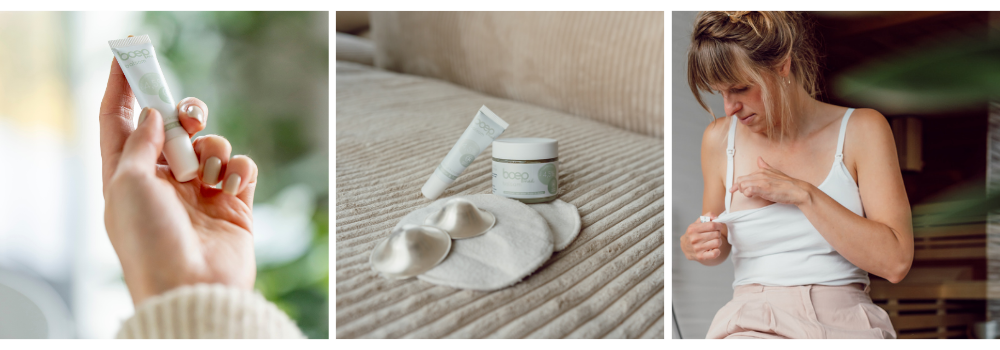
Nipples are one of the most sensitive parts of our body and can react particularly sensitively to breastfeeding or hormonal changes in the body. Many mothers, especially at the beginning of breastfeeding, have to deal with sore, inflamed, cracked and sometimes even bloody nipples and suffer from distressing pain that can make any mother despair.
Together with our midwife Charlotte, we will explain possible causes, but above all give you valuable tips on how to prevent sore nipples and how to easily treat them at home.
- Causes of nipple inflammation
- Prevent sore nipples
- Tips for sore and inflamed nipples
- Which ointment helps with sore nipples?
- Can I breastfeed even if my nipples are bleeding?
- How long does it take for the inflammation to heal?
What can be the causes of nipple inflammation?
First of all, it's very important to note that breastfeeding can be a huge challenge for any woman who has never breastfed before. We never want to make you feel like you're doing something wrong. Because you're trying and if it doesn't work despite all your efforts, that's OK. We've experienced many breastfeeding stories in our team and want to tell you that you're not alone!
To help you, we list possible causes that can lead to persistent pain when breastfeeding:
- Inadequate attachment or difficult breastfeeding technique, which means your baby is not latching onto the nipple properly. Your midwife or breastfeeding consultant can help you with this - and then relief will soon be in sight!
- "Too much" milk, so that the breast is so full that the baby cannot grasp the nipple properly. In this case, it can help to express milk from the breast before breastfeeding or to relieve the pressure on the breast a little by using a collecting bowl.
- Anatomical causes that cannot be solved ad hoc: these can include a tongue tie that is too short or flat (inverted) nipples. In consultation with the treating doctors, measures can also be taken here to make breastfeeding possible again.
- It is not uncommon for the nipple or milk ducts to become infected with a germ or fungus. The moist environment in nursing pads and tampons can encourage this. We recommend changing nursing pads often, allowing plenty of air to reach the breast and, if possible, washing every day with just clean water in the shower.
How can I prevent sore nipples?
- Bring the baby to the breast, not the breast to the baby. Let the baby latch properly so that the nipple is completely in the mouth and take your time if this doesn't work right away.
- At the beginning, always assume a comfortable breastfeeding position and support your posture with a pillow behind your back or under your arms.
- Regularly change your position and the position of your child when breastfeeding. Positions that may seem unusual at first glance, such as the football position or lying down positions, can help the baby to latch on properly and you can relax at the same time.
- Never remove the nipple forcefully, even if your baby has fallen asleep while breastfeeding. The best way to release the vacuum is to gently push your little finger into the corner of your baby's mouth.
Tips for sore and inflamed nipples
If your nipples are still inflamed or sore despite all the measures you have taken, these tips can provide you with quick relief. Please be assured: We really feel for you and know how uncomfortable this can be!
- After breastfeeding, spread one or two drops of breast milk or some of the baby's saliva on the inflamed skin and let it air dry
- Allow plenty of air to reach the breast so that the skin can regenerate and breathe after breastfeeding
- Make sure that nursing bras and nursing pads are made of fabrics and materials that are as breathable as possible
- So-called silver caps can be placed on the nipple after breastfeeding and help quickly heal the inflamed skin
- You can also apply a mild nipple ointment to the affected areas to keep the skin supple and heal quickly
Which ointment helps with sore nipples?
To soothe the inflamed breast and support the natural healing process, you can apply our vegan nipple balm after breastfeeding. High-quality almond oil and evening primrose oil provide long-lasting, rich care without sticking. The practical applicator and soft consistency make it easy and, above all, hygienic to apply. The best thing is that the balm does not need to be washed off before the next breastfeeding thanks to its natural ingredients.

Can I breastfeed even if my nipples are bleeding?
Yes - and as described above, breastfeeding can even support the healing process. Your baby's saliva and breast milk clean the sore skin on the nipple in a completely natural way and can stimulate healing. Silver nipple shields have also always helped us. If you have really severe pain that lasts for days, you should still contact your midwife or doctor treating you.
How long does it take for the inflammation to heal?
The duration of nipple inflammation varies from person to person. However, it usually takes about one to two weeks for the inflammation to improve significantly or heal.
If the symptoms persist or even get worse, we recommend that you contact your midwife, specialist and/or a breastfeeding consultant to rule out a bacterial infection and discuss further treatment steps. You can also always get valuable tips on breastfeeding from these experts.







